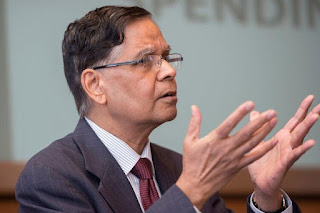Arvind Pantagariya stated that while significant progress has been made, such as reforms to the Goods and Services Tax. (GST), more needs to be done on land and labour in order to encourage multinationals from leaving China.
Arvind Panagariya is the Chairman of the 16th Finance Commission. He has stated that India's internal policies are the main reason for its limited success in capturing the China plus one opportunity. India also has a huge advantage over countries like Vietnam and Thailand because of India's size and domestic supply chain.
The NITI Aayog Report noted that countries like Vietnam, Thailand and Cambodia have emerged as the biggest beneficiaries of the China Plus One' Strategy. Factors such as lower tariffs, simpler tax laws and cheaper labour played a key role in increasing their export share.
Panagariya stated that India should not limit Chinese investments in certain sectors. However, it is important to consider the source of the investment.
"But the real reason for our disadvantage is policy." Land is incredibly expensive and employment of labor is incredibly difficult. We need to address these policy and internal policy barriers that limit flexibility. Vietnam, for example, is a relatively small country. As soon as you pass the 80-90 million inhabitants of the country, your wages will begin to rise. "In India, there is a supply of workers with various skills levels that can be maintained without a significant increase in wages," Panagariya said at the CII Global Economic Policy Summit.
Panagariya stated that although significant progress has been made, such as with the Goods and Services Tax reforms (GST), more needs to be done on land and labour in order to attract multinationals out of China. Panagariya stated that India is the only country capable of replacing China in 15 to 20 years.
Panagariya said the arguments about protectionism are false. He also argued that the argument that the world has become more protectionist and that automation would lead to a reshoring in manufacturing, which could result in India having fewer opportunities than China, Taiwan, Singapore, South Korea etc. had, is flawed.
"It's true that protectionism has increased, but even if we take that into account, the world market today is probably more open than at any other time in history. The global merchandise export market is now worth $25 trillion. This is the peak since COVID. He said that the pre-COVID peak was $18 or $ 19 trillion.
He said that the export of services peaked at $7 trillion, up from $6 trillion before COVID.
"Our share of this huge market is less that 2 percent for exports of merchandise and less than 4 percent for services. We are still a tiny part. We can't say whether this trade will grow in the future, but we do know how small it is. China has a share of about 12-13 per cent. Panagariya stated that there are many opportunities for us on the global market.
Sunil Barthwal, Commerce Secretary, said that the world must avoid protectionism which increases trade barriers and impedes the flow of goods. He said that one should avoid a mercantilist mindset and not worry too much about imports and trade balance.
He said that if India's economy grows at 7 percent and the rest of the world grows at 3-3.5 percent, then India will need more imports. Let me also tell you the importance of imports to exports.
"As long we can improve our exports, we shouldn't be too concerned about imports. That is what I think we should avoid," he said.




0 comments:
Post a Comment